Bill Of Rights
Bill Of Rights: Easy to understand
The Bill of Rights, created in 1791, consists of the first ten amendments to the US Constitution, designed to protect individual freedoms and limit government power. It was important because it helped ensure the ratification of the Constitution by addressing concerns that it granted too much power to the federal government. The document represented a promise to protect essential liberties like freedom of speech, religion, and the right to a fair trial, which were highly valued by citizens. Today, the Bill of Rights continues to matter as it safeguards individual rights; for example, freedom of speech allows people to express opinions and advocate for change without fear of government punishment. This enduring protection helps maintain a democratic society where everyone's voice can be heard.

Practice Version

Bill Of Rights: A document of the first ten amendments to the US Constitution. Bill of Rights. The Bill of Rights lists fundamental freedoms and protections for American citizens.